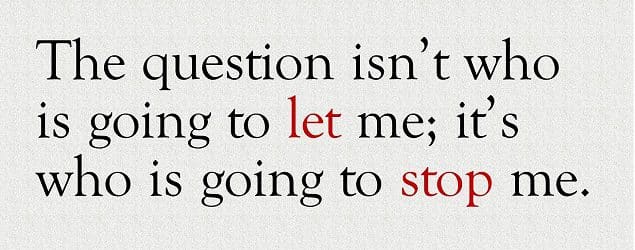Ayn Rand Has Influenced Conservatives More than They Admit, But Less than the Left Thinks

The conservative response to the spate of articles trying to tie Trump support to Ayn Rand has been interesting to watch. In particular, I was eager to read Kevin D. Williamson’s take, since I typically find his writing insightful, even if I don’t always agree.
Unfortunately, this was not one of his better pieces. And not just because he takes a bunch of gratuitous swipes at Rand and Objectivists. That’s par for the course at National Review.
No, the real problem was that, in trying to make a valid point — that the left has wrongly portrayed Rand as the central intellectual influence on conservatives — he went a bridge too far, and tried to pretend that fondness for Rand’s work is the exception among conservatives rather than the rule.
Where you don’t meet a lot of Randians is in the conservative world. . . . Bring up your undying love of Atlas Shrugged at the typical conservative gathering and people will smile at you and try very hard not to roll their eyes. Some people think of her novels as a kind of guilty adolescent enthusiasm now grown out-of-date, an intellectual mullet, a stage one goes through between the ages of 14 and 20. Some people use Atlas Shrugged as a totem — it had a moment at the cresting of the Tea Party phenomenon. But it is rare to meet actual adult human beings who organize their politics views (or, for pity’s sake, their lives) around Ayn Rand and her views. I don’t think National Review has a single Randian in the house; I’d be surprised if the Weekly Standard did, and if one showed up at Commentary then John Podhoretz would simply mock him out of existence.
He doth protest too much. As someone who has spoken to (and with) thousands of conservatives, including no small number of conservative intellectuals, admiration for Rand is the norm.
In fact, Rand has had a real and lasting influence on the conservative movement. And while the left is wrong to treat her as, well, the fountainhead of conservatism, conservatives should recognize that their movement would look very different were it not for her work.
What has Rand’s influence been? Well, it’s important here to distinguish between “the right,” broadly understood to mean all those sympathetic with free markets, and conservatives — especially conservative intellectuals.
I would put it this way: though Rand’s influence on the right’s ideas has been limited, her influence on its attitudes has been profound.
You can see this in the way those on the right (sometimes) talk about capitalism, about business, and about self-interest. To whatever extent they view these things as morally good, they reveal the impact of Ayn Rand. To put it mildly, such attitudes were not widespread prior to Rand’s work.
The trouble is, very few on the right have bothered to understand the reasons Rand gave to support her moral evaluation of capitalism, business, and self-interest. And that’s a very precarious position to be in, since those are precisely the concepts that are under attack by the right’s opponents. Attitudes can’t survive for long without ideas to support them.
With conservatives the issue is more complicated, because to the extent they do pay attention to Rand’s ideas, they are by necessity going to be conflicted: above all, Rand’s rejection of faith and altruism runs directly counter to conservative religiosity.
For the more intellectually inclined conservatives, the differences between Rand’s philosophy and theirs are even starker. Whereas she upheld a heroic vision of man they hold what conservative thinker Thomas Sowell calls a “tragic vision” of man’s inherent limitations and imperfections. Whereas she held that all ideas need to face the scrutiny of reason’s light they see the rejection of tradition as a threat to the social order and the root of tyranny. Whereas she regarded the individual as the basic unit of society they elevate the family and the community. Whereas she was a principled champion of laissez-faire capitalism they view unrestrained selfishness as morally intolerable and advocate a regulatory-welfare state that limits self-interest for the common good. It’s not that they don’t get what Rand is saying — to a large extent they do, and they reject it.
At the same time, many of these people recognize that there is something right in Rand’s celebration of productive achievement, the pursuit of happiness, and the capitalist system that makes these things possible. This has sent some of them on a quest to justify these attitudes by appealing to more conventional conservative ideas. I’m thinking, for instance, of Michael Novak’s work trying to make a moral case for capitalism by appealing to religion, George Gilder’s work trying to make a moral case for capitalism by appealing to altruism, and Arthur Brooks’ work trying to make a moral case for capitalism by appealing to “social justice.”
One of the reasons Yaron Brook and I wrote our first book, Free Market Revolution, was to explain why this can’t work — why Ayn Rand was right, that you cannot defend capitalism and business without a deeper defense of reason and self-interest.
But this would require jettisoning ideas conservatives hold dear. Leading conservatives understand this, and so are eager to distance themselves from her. But that doesn’t change the fact that many people on the right, conservatives included, continue to draw inspiration from Rand’s books.



